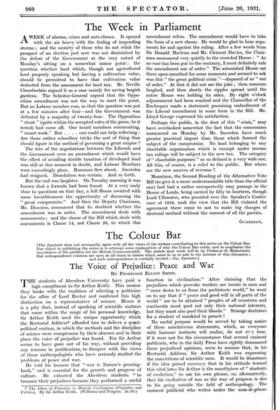The Week in Parliament
AWEEK of alarms, crises and anti-climax. It opened with the air heavy with the feeling of impending storms ; and the anxiety of those who do not relish the prospect of an election just now was not diminished by the defeat of the Government at the very outset of Monday's sitting on a somewhat minor point : the question whether land which, though not agricultural land properly speaking but having a cultivation value, should be permitted to have that cultivation value deducted from the assessment for land tax. Mr. Neville Chamberlain argued it as a case mainly for saving largish gardens. The Solicitor-General argued that the Oppo- sition amendment was not the way to meet the point. But no Labour member rose, so that the question was put at a few minutes after four—and the Government was defeated by a majority of twenty-four. The Opposition " stunt " (quite within the accepted rules of the game, be it noted) had come off. One heard members commenting, " smart work." But . . . . one could not help reflecting ; Are those rather schoolboy tricks the sort of thing that should figure in the method of governing a great empire ?
The fate of the negotiations between the Liberals and the Government over an amendment which would have the effect of avoiding double taxation of developed land was still at this moment in doubt, and Labour Members were exceedingly glum. Rumours flew about. Snowden had resigned. Dissolution was certain. And so forth.
But the end was laughter. On Tuesday morning it was known that a formula had been found. At a very early close to questions on that day, a full House awaited with some breathlessness the opportunity of discussing the " great compromise.". And then the Deputy Chairman, Mr. Dunnico, announced that he doubted whether the amendment was in order. The amendment deals with assessments ; and the clause of the Bill which deals with assessments is Clause 14, not Clause 20, to which this amendment refers. The amendment would have to take the form of a new clause. He would be glad to hear argu- ments for and against the ruling. After a few words from Sir Donald Maclean and Mr. Clement Davies, the Chair- man announced very quietly to the crowded House : " As no case has been put to the contrary, I must definitely rule the amendment out of order." The astonished House sat there open-mouthed for-some moments and seemed to ask was this " the great political crisis "—disposed of as " out of order." At first it did not see the joke ; then someone laughed, and then slowly the ripples spread until the entire House was holding its sides. By eight o'clock adjournment had been reached and the Chancellor of the Exchequer made a statement promising embodiment of the Liberal amendment in some form in the Bill. Mr. Lloyd George expressed his satisfaction.
Perhaps the public, in the dust of this " crisis," may have overlooked somewhat the fact that the concessions announced on Monday by Mr. Snowden have much greater practical import than those which formed the subject of the compromise. No land belonging to any charitable organisation which is exempt under income tax rulings will be subject to the new tax. The category of " charitable purposes " as so defined is a very wide one. All this, of course, is a relief to the public. But where are the new sources of revenue ?
Meantime, the Second Reading of the Alternative Vote Bill (to give it a more understandable title than the official one) had had a rather unexpectedly easy passage in the House of Lords, being carried by fifty to fourteen, though Lord Ullswater, who presided over the Speaker's Confer- ence of 1918, took the view that the Bill violated the agreement there come to not to make big changes of electoral method without the consent of all the parties.
GUARDIAN,










































 Previous page
Previous page